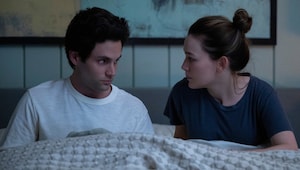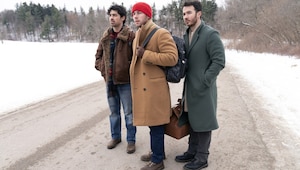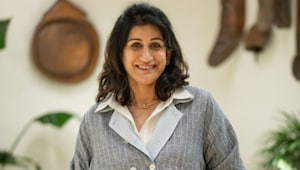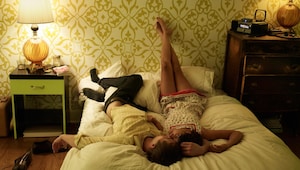#SerialChillers: Debina Bonnerjee: I’m like a lioness guarding her cubs
The fourth actor in the #SerialChiller series is Debina Bonnerjee who talks about why women should be the master of their own journey, pursuing motherhood, how society can be sensitive towards expectant mothers, and if she misses being back on screen.

Having done my homework and research for Debina Bonnerjee before interviewing her, I knew it was going to be a good one. She has exhibited immense strength throughout her pregnancy journey and beyond. From the lows, which began with trying for a baby for five long years, to the highs—where she is now a doting mother to two lovely girls, I was here to hear all about her journey between these two points. And the conversation was brimming with positivity and inspiration as the Ramayan actress spoke about parenting and being a mother while addressing the societal pressures women face.
The fourth actor in the #SerialChillers series, Bonnerjee, talks about one of the most challenging times of her life, how she dealt with trolls during pregnancy, her ‘miracle baby’, the responsibilities of a mommy influencer and much more. Here are the excerpts from her exclusive conversation with Cosmopolitan India.

Cosmopolitan India: You were blessed with two children after trying for five years. What is your advice for couples trying to become parents?
Debina Bonnerjee: First things first, always remember, there is a time for everything. I’ve met many people who chose their careers over parenthood, which is okay. But when they wanted to start a family, things didn’t go their way. I also know people who, at the peak of their careers, chose parenthood, and that’s okay too. The timing is crucial; you need to map out your life. Sometimes, when you push things for later, you might lose that small window when you have the power to decide and make things happen.
The second thing I would say is that society deems a woman as ‘complete’ only if she is married and has children, which shouldn't be the case. Yes, being a wife and a mother is a beautiful thing, but it’s not the only thing. A woman is complete in herself. She doesn’t need a man or a child to complete her. People don’t realise that the more people ask someone when they are getting married or pregnant, the more the person wants to defy the expectations. There is a lot of pressure and that delays things further for the person.
I’d like to tell every woman out there that your journey is completely yours. Be the captain of your own ship and don’t be disheartened by what people have to say.
CI: You documented your entire pregnancy. Did you have any concerns, or some dos and don’ts before you started out?
DB: People are way bolder than me. I couldn’t document everything as one goes through a lot mentally during that time. There are life situations which catch you point-blank and cannot be recorded, but the calmer moments, which were under my control, were shared with the public. I try to only show things that will help people. I never spoke about failures as and when they were happening; I talked about them when I had a success story to go along with it because that will encourage the audience to take challenges in their stride.
CI: Why do you call Divisha a ‘miracle baby’? What were the challenges you faced during your second delivery?
DB: In the five years that we were trying, doctors had suggested all possible ways to get pregnant, including IVF, as my fertility was on the decline. I started introspecting if I had delayed it too long and felt sad about myself and my body. You can deal with physical changes through workouts, diet and so on, but it is difficult to cope with what’s happening emotionally. With each passing moment, I felt like I was drowning. I did not realise Divisha was conceived until I felt a difference in my body. I was in utter disbelief. When we heard the heartbeat on the ultrasound we thought, ‘If this isn’t a miracle, what is?’
There were complications in my pregnancy and until she was born, we were worried if it was going to be a healthy baby. But she was born perfectly fine, and that, we think is a miracle.
CI: Had you considered adoption?
DB: Adoption was an option, but it’s a difficult process in India. We even considered going to the Mother Teresa Anbu Illam (orphanage) as I wanted to be among children to know what I was getting into. But unfortunately, we couldn’t make it for our appointment.

CI: What made you not give up and pursue motherhood with such commitment?
DB: I’m a headstrong person, and I complete what I have set out to do. I think that kept me going, but I honestly don’t know where I got the strength from. I think God shows you the way. Today, there are women who write to me saying they stopped their treatment but got the courage to do so after reading about my journey, and I’m happy about it.
CI: Why do people expect so much from a mother—from the time they are pregnant to when they are bringing up the child? What do you think should change?
DB: People’s unnecessary inquisitiveness should stop. They aren’t in the shoes of a woman to know what she’s going through. They unnecessarily want to be involved in every step of the journey and feel entitled to ask about every update. Since I had a back-to-back pregnancy, people felt free to ask ‘You just had a baby, why again?’ It felt like my entire life was dictated by other people and it was my duty to apprise them about every little thing that happens in my life. Some even felt comfortable telling me ‘You’ve got two girls; you’ll now try for another baby since you’ll want a boy’! It’s up to you if you listen, hit back, or shut yourself out. I reply to those who matter to me and whose ideas I want to change. Trolls will always be there, but my story will inspire a greater audience.
CI: How can people be more sensitive towards women when it comes to the importance of having a baby?
DB: Sometimes, we get busy in our careers and forget that a clock is ticking, and things might not happen when we want them to. But instead of pressuring women or being insensitive about the subject, they can be spoken to subtly and with compassion. They need to be assured there is absolutely no pressure on them. Maybe I didn’t want a kid at that time, or maybe I was trying for a kid, but who gives them the right to call me names or say mean things to me without knowing my journey?
CI: How has motherhood been treating you? What changes has motherhood brought in you?
DB: Until my babies—Lianna and Divisha—were born, I thought I would go back to being my usual self and doing and eating things I like. But you change a lot after motherhood and when I look back, I don’t think I fit in those shoes anymore. For me, my work was my religion. It is the same even now, but there is a change today and a part of me is glad the change happened. If this had happened earlier, maybe, I’d go back on the sets immediately, but I value what I have today and cherish it every single minute.
When kids grow up in front of you, you realise how fast time flies. I am holding this time like sand, and enjoying every single bit of it.

CI: How are you and your husband (Gurmeet Choudhary) balancing work and taking care of the little one?
DB: There’s nothing set in stone; whoever’s there with the kids at that time, takes care of them. We are both learning and doing things together.
CI: We know about how you felt when you were pregnant, what was he going through?
DB: It was a difficult time for him as well; on the one hand, he was dealing with societal pressure, and on the other, he was giving me all the support—mentally and emotionally. There were days when he told me, "There’s absolutely no need to go through this. Let’s adopt a child." He has been a rock-solid partner.
CI: What’s your relationship secret?
DB: Our relationship is strong because we met each other when we were nobodies. We’ve seen each other at their lowest lows and in the most vulnerable state. The feeling of happiness and euphoria is not a peak; it’s more of a plateau. We are always there for the lows and do not let them hit the lowest.
CI: How much do you miss being back on screen?
DB: I miss being on screen, but not the time spent on the set as some of them are located far away, even on the outskirts of Mumbai. Spending 14-16 hours out of the house doesn’t amaze me. Everything changes with time; something that used to excite me for a long time doesn’t anymore. I’m like a lioness guarding her cubs. The moment I feel that my cubs are ready to walk on their own, I’ll be back.
I did get a few offers, but I had to let them go because it wasn’t the right time. I am taking things slow because I want to cherish these moments. There will be a time when the kids won’t need me much, so I might as well enjoy the present. Right now, they need me and I need them more.

CI: You have dealt with trolls and negative feedback. How do you switch off all the noise?
DB: Today, even the smallest noise reaches everyone’s ears; and this was true even before social media. During Ramayan, a lot of people commented that I didn’t look the part, I looked ugly, and I didn’t look good with Gurmeet, and so on. I didn’t pay heed to anyone commenting on my pregnancy or getting unnecessarily inquisitive. They can’t weaken me. If there are people calling me names, there is a far larger number who are inspired by my story.
CI: Tell us about the time when you played the role of Sita.
DB: We were in Vadodara, under an exclusive contract where we couldn’t make any public appearance; we couldn’t step out of the set and see people’s reactions. When the show was close to an end, we went on a country tour to promote the show. We saw our pictures in the temple, and in people’s houses, and crowds came and touched our feet. It was an explosion of emotions and I couldn’t fathom it. Gurmeet, surprisingly, could. He took it all so graciously.
CI: What do you think about the kind of roles being written for women today?
DB: Women’s demeanour has changed over time—from being docile and submissive, they have learnt to stand up for themselves. They take pride in what they do. And when I come back, I want to do stronger roles. I can’t think of doing something that’s not impactful. Even when I was playing Sita, I was portraying a strong personality. The character was etched to be stronger than Ramanand Sagar’s Sita. I need to be a part of stories where there is a lot of substance.
CI: Which characters of yours have a special place in your heart?
DB: All of them are my babies. The one really close to my heart is Mayuri (from Chidiya Ghar). I didn’t know how well it was appreciated until people started telling me that. Audiences loved my mannerisms and I loved the innocent characterisation. It’s a show you could leave your brain aside and enjoy the fullest. Another character was Vishaili/Vishkanya (Vish: A Poisonous Story). I came in as the villain on the show but the show started revolving around me. I started enjoying it so much that I became the character and the character became me.
CI: Tell us about your role as a mommy influencer.
DB: An influencer is a link between the brand and the consumer. As a mommy influencer, I have the responsibility to talk about brands that adhere to my sensibilities and the guidelines I follow for my children. I would never endorse a brand that doesn’t do justice to my child’s health. Our children are precious. As mommy influencers, we should be responsible as we are a community and I love being there.
Cosmopolitan India's series 'Serial Chillers' shines the spotlight on six spectacular TV actors who, with each passing day and every exciting episode, prove they are indeed a force to reckon with.
Also read: #SerialChillers: Nakuul Mehta: "I don’t want to limit myself to being just the biggest TV star there is right now"
Also read: #SerialChillers: Rupali Ganguly: “My tombstone should read—here lies Monisha Sarabhai and Anupamaa”
Also read: #SerialChillers: Divyanka Tripathi makes a case for TV actors’ success on OTT platforms
more from Celebrity

“Pebbling” is the non-toxic, genuinely adorable dating trend we all needed

Is 'future faking' the new gaslighting? Decoding this new dating trend

Bad at gifting? Check out these stocking stuffer ideas based on each zodiac sign

15 new Christmas movies you might want to add to your 2025 holiday watch list

Why glycolic acid is your skin's best friend for the winter season

How training for a marathon became the most honest conversation I have ever had with myself

Emily in Paris season 5 is back—and we’re still hate-watching every minute of it

Women have long been having sex on the first date—so why do some of us still feel shamed?

The 'shixie' is a modern take on the 70s shag haircut: 10 style ideas and how to wear the trending look

These are the most Googled dating and relationships questions of 2025—and, er, it’s been an anxious year
